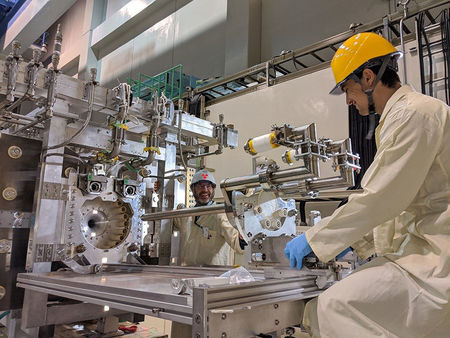Dr. Chris J. Densham, innovator of neutrino production targets, wins the Institute of
Physics Prize for Outstanding Professional Contributions
Dr. Densham (middle) working on the installation of a target into an electromagnetic horn
(at the JPARC Neutrino Facility, January 2020)
Dr. Chris J. Densham at Rutherford Appleton Laboratory, United Kingdom, who has been designing and developing the neutrino production target, beam window, and other components at the J-PARC neutrino facility, wins the 2021 Institute of Physics Prize for Outstanding Professional Contributions to accelerator science and technology:
At high-energy accelerator facilities like J-PARC, a high-intensity proton beam from an accelerator strikes a target to produce particles such as neutrinos, muons, etc. The target is exposed to severe heating and pressure shock waves caused by beam bombardment, and further suffers degradation of materials due to radiation damage. Dr. Densham, as the leader of the high-power target group at Rutherford Appleton Laboratory, United Kingdom, organizes distinguished engineers, and has made pioneering contributions to the development of targets for the world's forefront high-energy experiments. The T2K long-baseline neutrino experiment at J-PARC is one of them, in which Dr. Densham participated as the core engineer from the outset. Without Dr. Densham's advanced engineering expertise and interdisciplinary approach, including nuclear and fusion materials research, the design and development of major in-beam equipment, including the neutrino production target with its remote exchange system, the primary proton beam window, the baffle collimator, and the beam dump hadron absorber, would never have been accomplished. Also, Dr. Densham was one of the first to recognize the importance of the development of materials to withstand high-intensity beam exposure as the key to realizing next generation accelerator operation, and promoted to establish the RaDIATE (Radiation Damage In Accelerator Target Environments) international collaboration for this purpose, along with engineers and scientists at the Fermi National Accelerator Facility, United States, and other institutes.
Further success by his team on development of targets and beam windows to tolerate higher beam power is greatly anticipated, and is actually indispensable to open the way to the next generation neutrino oscillation experiments, Hyper-Kamiokande with J-PARC in Japan and DUNE in the United States. Congratulations - Omedetou - Dr. Chris Densham.

